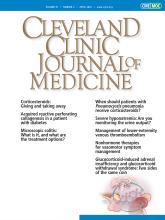ABSTRACT
Diseases of the adrenal glands can lead to primary adrenal insufficiency, and suppression of the hypothalamic-pituitary-adrenal axis can cause secondary adrenal insufficiency (adrenal suppression). The most common cause of adrenal suppression is exogenous steroids, a condition recently termed glucocorticoid-induced adrenal insufficiency (GIAI). Similarly, weaning from high doses of glucocorticoids or giving insufficient glucocorticoid replacement after curative surgery for endogenous hypercortisolism (Cushing syndrome) can lead to glucocorticoid withdrawal syndrome, which overlaps with GIAI.
- Copyright © 2024 The Cleveland Clinic Foundation. All Rights Reserved.
- Noura Nachawi, MD⇑
- Department of Metabolism, Endocrinology & Diabetes, University of Michigan, Ann Arbor, MI; Assistant Professor, University of Michigan, Ann Arbor, MI
- Address:
Noura Nachawi, MD, 24 Frank Lloyd Wright Drive, Ste 1300, Lobby C, Ann Arbor, MI 48105; nachawin{at}med.umich.edu
- Dingfeng Li, MD
- M. Cecilia Lansang, MD, MPH
ABSTRACT
Diseases of the adrenal glands can lead to primary adrenal insufficiency, and suppression of the hypothalamic-pituitary-adrenal axis can cause secondary adrenal insufficiency (adrenal suppression). The most common cause of adrenal suppression is exogenous steroids, a condition recently termed glucocorticoid-induced adrenal insufficiency (GIAI). Similarly, weaning from high doses of glucocorticoids or giving insufficient glucocorticoid replacement after curative surgery for endogenous hypercortisolism (Cushing syndrome) can lead to glucocorticoid withdrawal syndrome, which overlaps with GIAI.
- Copyright © 2024 The Cleveland Clinic Foundation. All Rights Reserved.






